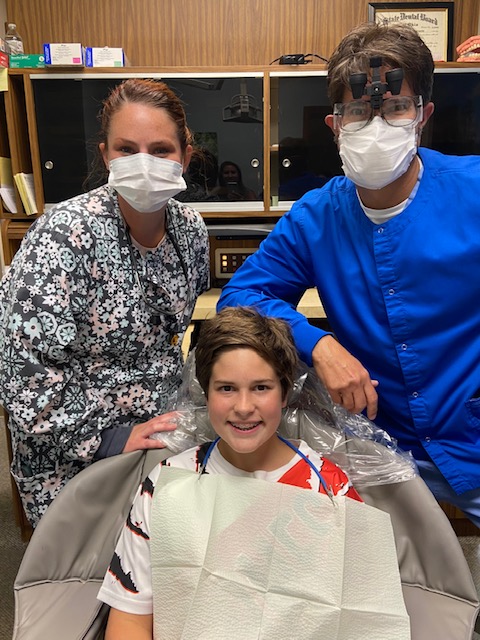|
Adolescent Oral HealthIt is very important for children and adolescents to take care of their teeth. Good adolescent oral health (including sealants) can prevent a variety of dental issues. Because of their many bumps and grooves, the chewing surfaces of children and adolescents' teeth are highly susceptible to cavities. Debris and the bacteria resulting from it may become lodged between the grooves of a teenager's tooth. These grooves (called pits and fissures) may be more problematic for some teenagers than for others. Adolescents up to age 17 are considered more "cavity prone." Premolars and molars have the most pits and fissures, and are difficult for adolescents to reach with a toothbrush or dental floss. However, the application of sealants on the appropriate teeth can help prevent tooth decay. Dental sealants are usually applied on baby teeth soon after they erupt, and repeated at regular intervals over the years. Since the sealant is gradually lost through natural wear and tear of the teeth, the application must be repeated to remain effective. The Dental Depot commonly performs sealant procedures on patients ranging from children to adolescents.

Chronic gingivitis is common in children and teenagers. It usually causes gum tissue to become swollen and red; gums might also bleed easily. Gingivitis can be prevented and treated with a regular routine of brushing, flossing and professional dental care. However, if it is left untreated, gingivitis can eventually advance to more serious forms of periodontal disease. Four basic signs might indicate periodontal disease in adolescents: Bleeding gums during tooth brushing, flossing or any other time; swollen or bright red gums; gums that have receded away from the teeth; and perpetual bad breath (halitosis) that does not improve with brushing and flossing. Please ask Dr. Ghering if you are concerned that you might have some signs of periodontal disease. Periodontal disease may increase during adolescence due to lack of motivation to practice oral hygiene. Children who maintain good oral health habits until they reach adolescence are more likely to continue brushing and flossing than children who were not taught proper oral care. In addition to improper adolescent oral health, hormonal changes related to puberty can put teens at greater risk for getting periodontal disease. During puberty, an increased level of hormones causes increased blood circulation to the gums. This may cause an increase in sensitivity of the gums and lead to a greater reaction to any irritation, including food particles and plaque. During this time, the gums may become swollen, turn red and feel tender. As a teen progresses through puberty, the tendency for the gums to swell in response to irritants will lessen. However, during puberty, it is very important to follow a good at-home oral hygiene regimen, including regular brushing and flossing, and regular appointments at the Dental Depot. In some cases, Dr. Ghering may recommend periodontal therapy to help prevent damage to the tissues and bone surrounding the teeth.
|
